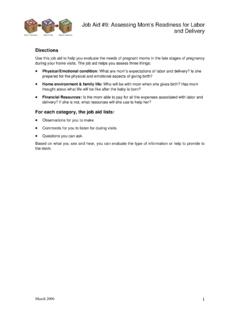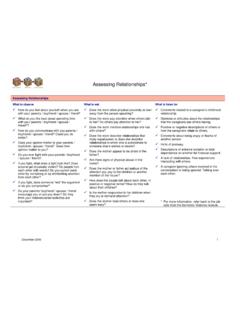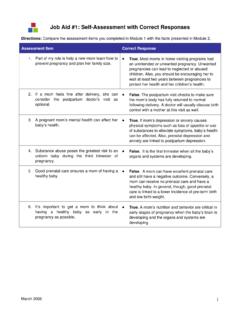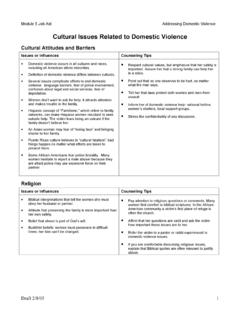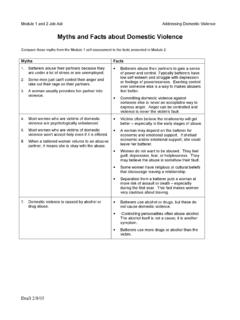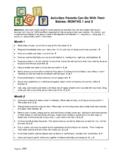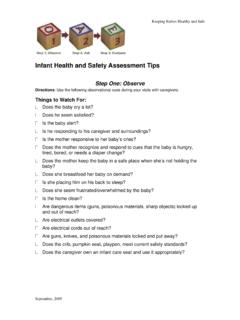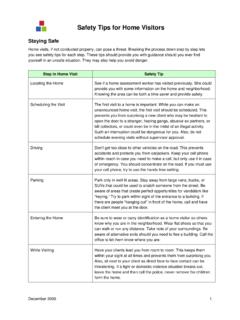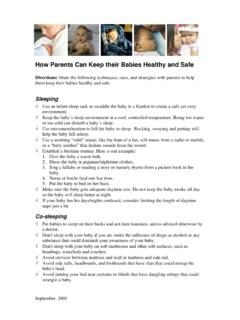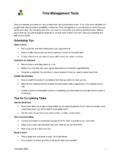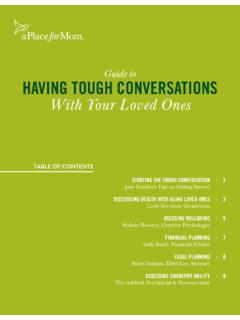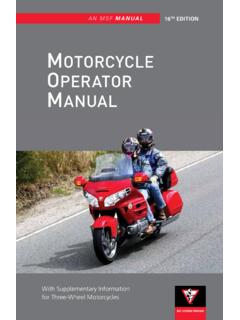Transcription of Job Aid #8: Supporting an Expectant Mom
1 Job Aid #8: Supporting an Expectant Mom After you have assessed the needs of the pregnant mom, you can use a four-step model to provide her with help: 1) Share appropriate information or anticipatory guidance. Recognize that some information will be new to the pregnant mom; other information, she'll already know, but not know how to use. (Example: You can know you should eat whole fruits and vegetables, but not know how to obtain or pay for these foods.). A great source of information can be found at: 2) Discuss the information. Find out what the mom knows and doesn't know. Find out what barriers may keep her from acting on the information you provide. 3) Connect the mom to appropriate resources. If she needs prenatal care, help her figure out where she can get it.
2 If she needs access to food, help her figure out where she can obtain it. 4) Follow-up with the mom on subsequent visits to find out if she acted on the things you discussed and used the resources you helped her find. The remaining pages of this job aid helps you identify information, support, and anticipatory guidance you can offer a mom. The job aid is organized into the same four categories you assessed: Completion of developmental stages/tasks: 9 Stage 1: Acceptance of pregnancy by mom and those around her. Beginning to think about changes baby will make in her life and in her family's life. 9 Stage 2: Growing a healthy baby. 9 Stage 3: Preparing to separate the baby from herself (birth) and care for it outside of her womb.
3 Environment: Is mom's environment healthy and safe for her and her baby? Financial Resources: Can the pregnant mom and/or her partner financially support her family? Social Support: Does mom have the social support she needs for her emotional well being and health? March 2006 1. Job Aid #8: Supporting an Expectant Mom Completion of Stage 1 Developmental Stages/Tasks - Acceptance of the pregnancy by the woman, her partner and her family; beginning to think about the changes the new baby will make in her life. Information and anticipatory guidance to share: Discomforts that mom can expect during early part of pregnancy and ways to manage these discomforts. Things mom can do now while she's adjusting to pregnancy that can protect her baby after he or she is born (Nutritional musts such as getting enough folic acid and eating complex carbohydrates and protein to help baby's brains and organs develop should be discussed as early in pregnancy as possible, assuming Mom will listen to the information.)
4 Explanation of the changes that are occurring in mom's body. Warning signs that indicate a problem that needs immediate medical attention. Completion of Stage 2 Developmental Stages/Tasks - Growing a healthy baby. Information and anticipatory guidance to share: Nutritional guidelines what to eat and what to avoid. The purpose of prenatal vitamins, and the importance of folic acid, in particular. The importance of prenatal care and the purpose of the tests and procedures that are part of a prenatal visit. Information on substance use/abuse and how it affects baby and mom's health. You need to specifically address cigarette smoking and alcohol usage. If you see evidence of domestic violence, you should also discuss the risks domestic violence poses to the mom and the baby.
5 The Building Healthier Families e-course on Addressing Domestic Violence offers great information on how to work with families experiencing domestic violence. The growth of the baby what's happening each month and what bodily changes mom can expect to see and feel. Discomforts mom may experience in middle to late pregnancy and how to manage these discomforts. Warning signs of problems that need immediate attention. March 2006 2. Job Aid #8: Supporting an Expectant Mom Completion of Stage 3 Developmental Stages/Tasks - Separation of the baby from the mother (birth) and readiness to transition to caring for baby outside the womb. Information and anticipatory guidance to share: The components of a birth plan what things mom should be thinking about as she prepares for labor and delivery and for bringing her baby home.
6 The physical and emotional changes mom can expect after delivery and up to six weeks after giving birth. The supplies the baby will need. Ways to prepare the home for the baby's arrival. Ways to prepare older siblings for the baby's arrival (if applicable). How to evaluate childcare options and arrange for childcare, if mom will return to work or school after baby's arrival. What types of help new moms commonly appreciate from friends, family, neighbors, and community and how to arrange for this help. Signs of labor and warning signs of a problem that needs immediate attention. Safety of Mom's Environment Information and anticipatory guidance to share: Features that make an environment safe and unsafe for both mom and baby.
7 Be prepared to talk about: Presence of a cat. Pregnant moms can get toxoplasmosis, an illness that can cause birth defects, from contact with cat litter or soil that has been contaminated by a cat. Sleeping arrangements after baby arrives (use of a crib that contains no stuffed toys, blankets, bumper pads, etc). Proper monitoring of pets around babies. Babies and young children should not be left unsupervised with any pet. Even the kindest pet can injure a baby if the baby accidentally hurts the pet. Dangers involving electricity and fire hazards. Exposed wires or electrical cords, overloaded circuits, space heaters, and fans can all pose hazards in a home. The importance of cleanliness in kitchens and bathrooms to prevent the spread of germs.
8 March 2006 3. Job Aid #8: Supporting an Expectant Mom Mom's Financial Situation Information and anticipatory guidance to share: Typical costs associated with a baby, including costs for child care, baby supplies (diapers, clothing, car seat, bottles, formula, baby food, high chair, etc), and medical care. Resources that can help families in need, including: 9 Special Supplemental Nutrition Program for Women, Infants, and Children (known as WIC). 9 Children's Health Insurance Program (CHIP) for working families who have no insurance. (For more information, go to ). 9 Food stamps. 9 Local food pantries. 9 Sources for free or low-cost clothing. 9 Utility company programs to provide heat bill payment plans and assistance.
9 9 Government housing options that offer rent-subsidized apartments and town homes. Mom's Social Support Information and anticipatory guidance to share: The importance of various types of social support (father of baby (FOB), other family, friends, community, neighbors) needed to keep mom and baby healthy. The difference between healthy and unhealthy social support. 9 For example, having FOB around is healthy if he can help support family financially and emotionally. 9 Having FOB around is unhealthy if he is violent, abuses substances, or does not contribute to the family's well being. The types of social support a healthy mom needs family, friends, community resources, neighbors, etc. March 2006 4.
